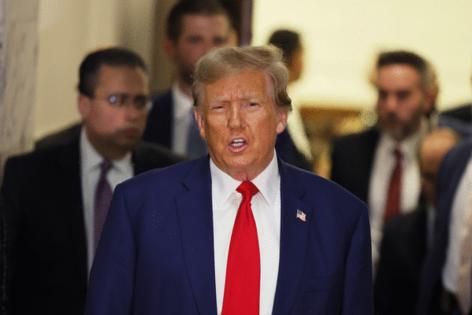Trump appeal in fraud case likely despite his 'total victory'
Published in Political News
Minutes after a New York court threw out a nearly half-billion dollar penalty against Donald Trump in a civil fraud lawsuit, the president declared the ruling a “total victory.” Trump still has plenty of reasons to appeal.
While the intermediate appeals court vacated the $464 million penalty, it still found Trump liable for fraud and left in place other sanctions that were part of the verdict in the landmark case brought by New York Attorney General Letitia James. That includes a temporary ban on Trump and two of his sons serving as corporate officers in New York.
“My guess is that Trump will want to remove the stain of this liability ruling,” said Adam Kaufmann, a white-collar criminal defense lawyer in New York, who isn’t involved in the case.
James, a Democrat, sued Trump and his sprawling real estate company in September 2022, more than two years before his successful bid to retake the White House. She won after an 11-week trial in which she presented evidence that Trump regularly inflated the value of assets, including Mar-a-Lago and his Trump Tower penthouse, for years to get better terms on loans. The alleged conduct saved Trump millions of dollars in lower interest rates, which the state sought to claw back.
The ruling Thursday from a five-judge panel of New York’s intermediate appeals court was widely seen as a win for Trump, knocking out one of the main legal liabilities remaining against him and his company. But the lengthy opinion, which came nearly a year after oral arguments, was filled with findings that could give solace to both Trump and James.
The deeply divided panel issued three competing opinions, none of which got a majority. The judges agreed unanimously that the fine against Trump was “excessive,” striking it down without even suggesting that a lower number be calculated. But they split on whether he should be held liable for fraud. The divide led to a compromise of sorts in which four judges affirmed liability even though only two of them actually agreed with that outcome.
‘Goal line’
The two detractors flipped their vote for the sole purpose of giving Trump a decision as soon as possible so he could move on with the next phase of the appeal. Justice David Friedman, who argued the whole case should be dismissed, said the resulting “win” for James on liability was like a football team being “awarded a touchdown without crossing the goal line.”
The ruling left in place significant nonfinancial penalties against the president, including the temporary bans on Trump and his sons as well as a requirement that the Trump Organization regularly submit its finances to an independent monitor. Crucially, the decision affirmed that James’ investigation was proper under New York law, a major point of contention as the U.S. Justice Department under Trump probes whether the attorney general violated the president’s rights by suing him.
Trump will likely appeal all those aspects of the case. Depending on how the state’s highest court rules, the U.S. Supreme Court could ultimately be asked to have the final say, drawing out the fight even further.
Aaron Harison, a spokesman for Trump, referred questions about an appeal to a social media post by the president saying the ruling “helps greatly to save the status and reputation of the New York Judicial System.” James has already said she will appeal.
James’ office declined to comment on when the state’s appeal may be filed but any challenge could drag out a final resolution in the case for months.
‘Lacking’
John Moscow, a colleague of Kaufmann’s at Lewis Baach Kaufmann Middlemiss, said that Thursday’s opinion was unusual in both its length and the degree of division between the justices.
“I’ve watched the Appellate Division for a long time and this is as lacking in mutual exchange of views and listening to the others as I have ever seen,” said Moscow, who was a top deputy to former Manhattan District Attorney Robert Morgenthau.
Only two of the five judges fully affirmed Trump’s liability. The other three judges said they believed the case was flawed but they could not agree on whether to order a new trial or dismiss the complaint. The three competing opinions hint at stark divisions over how James presented her case and how the lower court judge, Arthur Engoron, made his decisions before trial.
Justice Peter Moulton sided with James on liability and held that the attorney general had presented sweeping evidence of serious wrongdoing. The opinion, joined by Presiding Justice Dianne Renwick, leaned heavily on testimony by former Trump fixer Michael Cohen, who triggered the investigation by saying publicly that Trump inflated his assets.
“The trial record supports the court’s inference that President Trump had the intent to defraud,” Moulton wrote. He added that the nonfinancial penalties against Trump and his company “were measured and fair” given the “significant likelihood that defendants would reoffend.”
Another opinion, by Justice John Higgitt and joined by Justice Llinét Rosado, said the case was deeply flawed and should be sent back to the lower court for a new trial.
But in an unusual twist, the judges decided to side with Moulton and Renwick and affirm liability anyway, solely to allow Trump to expedite an appeal to the state’s highest court instead of waiting for a new trial. The judges said in a footnote that the decision was made with “great reluctance and with acknowledgment of the incongruity of the act.”
Friedman, however, said the case should have been tossed out entirely. He said the lawsuit was improper from the start, pointing out in a footnote that James had made “politically motivated promises to use her office to pursue one man and his businesses.”
©2025 Bloomberg L.P. Visit bloomberg.com. Distributed by Tribune Content Agency, LLC.
























































Comments